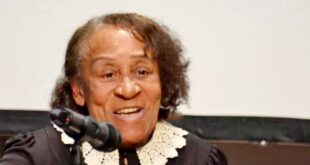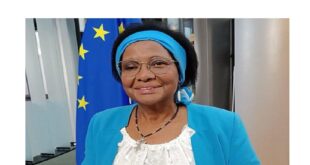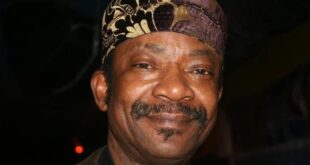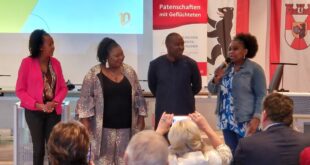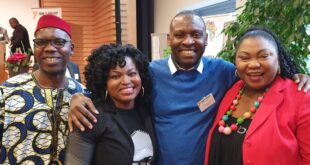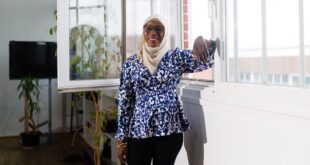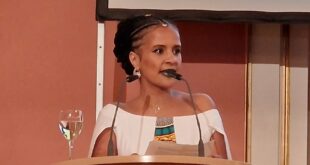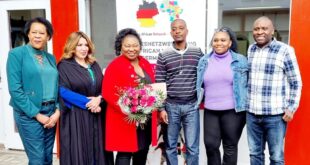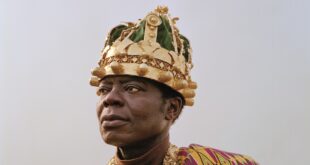Theodor Michael, who died on 19 October 2019, in this interview* conducted in September of 2003 at his home in Cologne talked about his eventful life and he gives counsel to people of African descent in Germany
—
What does it mean to be an elderly Afro-German reflecting on the time you were growing up?
Theodor Michael: We Blacks were numerically very few, there were about 60 Black families in the whole of Germany. However, growing up was not much of a problem, that is, before Hitler came to power. My two parents died earlier before the Nazi regime. My other siblings escaped to France, as it was becoming very difficult to live in Germany. I landed in the forced labour camp, but l survived despite all the Nazi racist laws. To survive in a totalitarian state depends on different circumstances. In my case, it is a miracle that is based on my strong evangelical faith that developed early out of my maternal Prussian background. My faith gives me the courage to hope and survive. Whatever the situation, l might have encountered, l always look for the lesson and move on. I am grateful to God that l survive.
Could you remember what your earliest experience and knowledge of people of Africa was. Was there any particular event or knowledge that gave you any sense of pride?
Michael: To be a German or an African is a matter of chance genetically. What can a man be proud about? I have always had interest in things about Africa before the war and that interest intensified after the war.
Could we talk a bit about your educational background, your profession and what you are doing now in retirement?
Michael: l could not go to a higher institution of learning during the Nazi time, it was unimaginable in the Nazi-German mentality that Africans have any intellectual capacity or could learn any profession. I moved on later in life to earn a university degree. I was a student under a famous German professor, Darrendorf. l retired as a Regierungsdirektor. I am an autodidactic historian and anthropologist and l am also a performing artist.

Do you have any vision or idea on how we could grow, move ahead and help ourselves as a community?
Michael: What connects all of us is our skin colour, and it should be a source of our solidarity. We should all struggle and fight against injustice anywhere and against any human being.
Compared with the time you were growing up, is this a good time for Afro-Germans and Africans to live in Germany?
Michael: No. It is a hard time for Africans. If you come to a foreign country like Germany as an art historian like Okwui Enwezor (the curator of the Documenta ll) or popular artists, then you have a chance. But without money, don’t expect Germans to embrace you. If you compete with them over jobs, they will ask you questions. Germans are not ready to allow people to take their jobs.
Does the elderly Afro-German has any advice or motivation for Africans on how to live in a foreign country?
Michael: I would not say you should adopt German ways, but you should adapt. You have to struggle to get acceptance and find your place in society. Because if you can’t beat them, you join them. Be modest in the letters you write home to Africa, let people at home know that the reality is hard and they should not expect too much from you.

We know today that culture expresses the highest hopes and aspirations of a people. Could you identify with any of these cultural expressions of Black people?
Michael: Classical jazz perhaps, but not more. I have a very deep African root, but my upbringing and formative background is German. I am used to listening to typical classical music.
Is there anyway you think media could help in the integration and acceptance of the minority, without the minority themselves losing their our cultural base?
Michael: Media would always try to propagate tolerance, as long as you don’t disturb their society. But l doubt, if the media would try to change the minds of their people to accept immigrants as potential competitors.
As a great-grandfather, what would you say to young people. How can they be realistic about this country and still sustain hope?
Michael: Every generation has its own role model. Beyond that, young people should desire and develop the courage to struggle and never to give up. There is great glory, joy, dignity, power and beauty in struggle. When we have a good sense of ourselves and a clear concept of what we want, we set the standard of how we want to be treated, then it remains our responsibility to make sure that anyone who comes into our lives treats us as well.
Would you say that all is well that ends well, that the journey, in the final analysis, is worth it?
Michael: Life generally is hard, it’s usually a matter of time and circumstances. It is always a school of learning, there are certain things you cannot avoid and there are things you can actually change. It is a pity that l could not study earlier, but then if my dream had come true, l probably could have missed some other good things in life. On the whole, l am satisfied, l am not unhappy, l have no regrets.
Robert Ajani & Charles Ofoji
* The interview was published originally in the December/January 2003/4 issue of The African Courier
READ ALSO Book: To Be Black and German by Theodor Wonja Michael
 THE AFRICAN COURIER. Reporting Africa and its Diaspora! The African Courier is an international magazine published in Germany to report on Africa and the Diaspora African experience. The first issue of the bimonthly magazine appeared on the newsstands on 15 February 1998. The African Courier is a communication forum for European-African political, economic and cultural exchanges, and a voice for Africa in Europe.
THE AFRICAN COURIER. Reporting Africa and its Diaspora! The African Courier is an international magazine published in Germany to report on Africa and the Diaspora African experience. The first issue of the bimonthly magazine appeared on the newsstands on 15 February 1998. The African Courier is a communication forum for European-African political, economic and cultural exchanges, and a voice for Africa in Europe.


